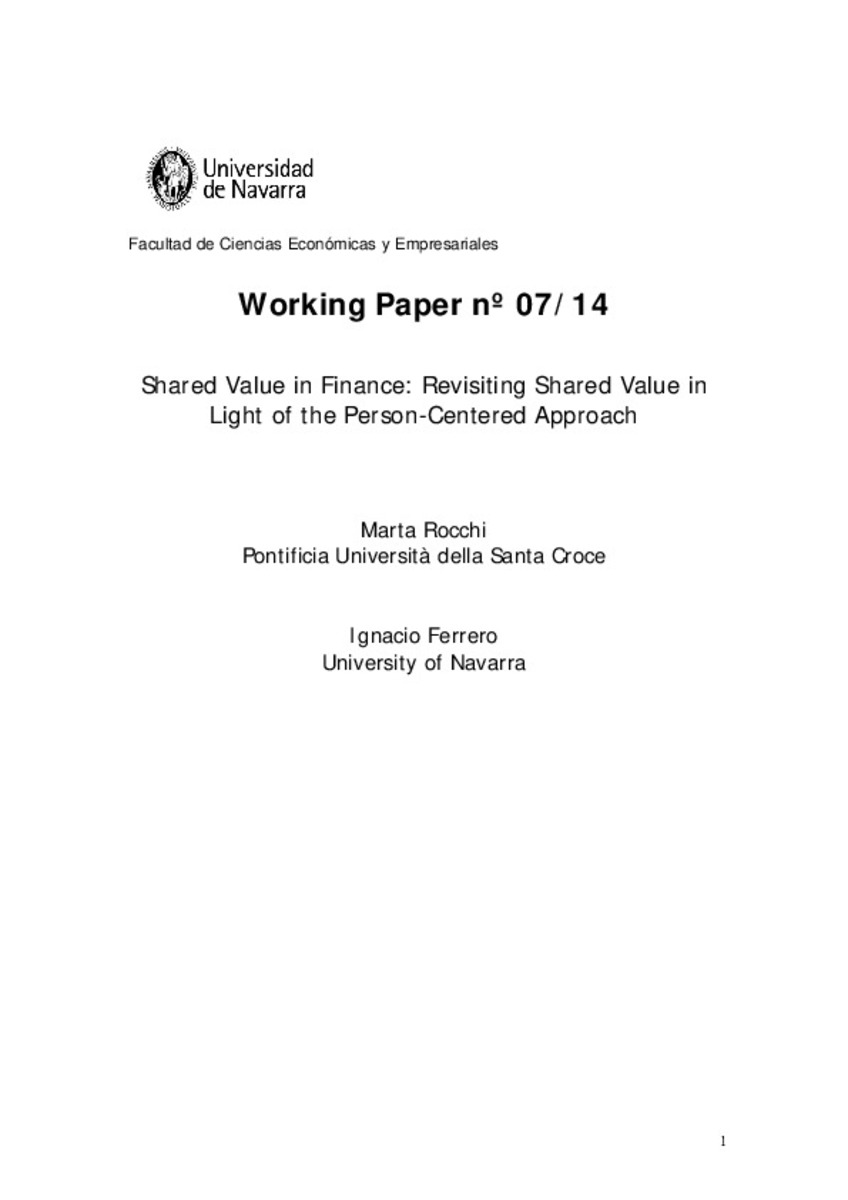Full metadata record
| DC Field | Value | Language |
|---|---|---|
| dc.creator | Rocchi, M. (Marta) | - |
| dc.creator | Ferrero-Muñoz, I. (Ignacio) | - |
| dc.date.accessioned | 2017-03-24T09:02:14Z | - |
| dc.date.available | 2017-03-24T09:02:14Z | - |
| dc.date.issued | 2014 | - |
| dc.identifier.citation | Rocchi, M. (Marta); Ferrero, I. (Ignacio). "Systematic Shared Value in Finance: Expanding Porter's Approach". En . , 2014, | es |
| dc.identifier.uri | https://hdl.handle.net/10171/43109 | - |
| dc.description.abstract | The publication of Michael Porter and Mark Kramer's Creating Shared Value (Harvard Business Review, 2011) challenges both the academic literature on corporate social responsibility as well as business practice. Porter and Kramer argue that there is a better way of integrating social goals within business practice, without distracting a firm from its primary purpose of achieving profit. This paper aims to expand Porter and Kramer's approach and to apply the shared value model to the financial sector, through analyzing the ways of systematic shared value creation in finance. We begin with an examination of Porter and Kramer's concept. Next, we evaluate the impact of shared value creation on academic literature. We distinguish between four groups of works related to shared value: Porter's work, Porter's co-authors, supporters (divided into followers and innovators), and critics.After implementing these steps, we address the two-fold purpose of this paper: 1. To examine Porter and Kramer's process-centered theory and 2. To investigate the financial application of a revised concept of shared value. In particular, we will explore the role of virtues as a missing pillar in Porter and Kramer's original theory. Integrating the shared value approach with virtues leads us from their process-centered approach to the person-centered approach that we call Systematic Shared Value. We believe that finance professionals can apply this new paradigm, formulating new ways of shared value creation. We conclude the article by presenting a preliminary systematic approach to shared value creation in finance. Corporate reputation (CR) has become a fashionable topic due, among other reasons, to the recent financial and economic crisis and spreading corporate scandals. Given its interdisciplinary character and intangible nature, CR has been a frequent issue in many disciplines, but scarcely present in the business ethics field. This neglect is odd since a good reputation is one of the most valuable consequences of doing the right things and the things right. In this paper, we intend to explain this absence through three hypotheses: a) business ethics literature largely identifies corporate reputation and corporate social responsibility; b) corporate reputation overlaps with corporate image and corporate identity, resulting interchangeable constructs; and c) business ethics scholars have focused on the negative side of the reputation phenomenon, highlighting reputational risk more than benefits. Based on a bibliometric analysis of the top journal of business ethics literature over a recent decade (2002-2011), we finally confirmed the three hypotheses although c) only partially. In addition, the findings of this study will allow for a deeper understanding of the link between looking good and doing well. | es_ES |
| dc.language.iso | eng | es_ES |
| dc.rights | info:eu-repo/semantics/openAccess | es_ES |
| dc.subject | Materias Investigacion::Economía y Empresa | es_ES |
| dc.subject | Shared value | es_ES |
| dc.subject | Finance | es_ES |
| dc.subject | Virtue ethics | es_ES |
| dc.subject | Michael Porter | es_ES |
| dc.subject | Corporate social responsibility | es_ES |
| dc.subject | Person-centered approach | es_ES |
| dc.title | Systematic Shared Value in Finance: Expanding Porter's Approach | es_ES |
| dc.type | info:eu-repo/semantics/article | es_ES |
Files in This Item:
Statistics and impact
Items in Dadun are protected by copyright, with all rights reserved, unless otherwise indicated.






